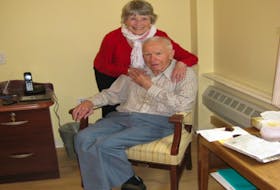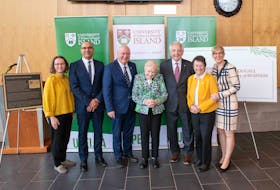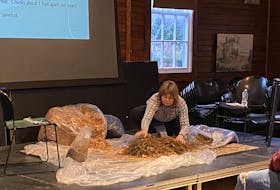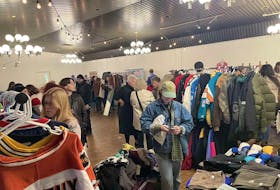AYLESFORD, N.S. — Joan Vogler’s father held her in his arms, pointing to the unrest outside her bedroom window.
“They were really bombing London. He held me up in the bedroom window and all we could see was the sky and the big, red lines. It was just burning up. And he said that he was going to have to leave,” the 86-year-old recalled.
Her six-year-old mind didn’t grasp the gravity of the Second World War.
She did, however, note a sense of urgency in her father’s voice.
“He was my favourite and the way he was talking to me, I knew something was up and he was probably going to be going away, but I didn’t realize how long.”
Growing up on the outskirts of London, in Wembley, she remembers hearing Prime Minister Winston Churchill’s war-time broadcasts in the streets as a child.
Vogler’s hometown became a battleground.
And her father – her favourite – was nowhere to be found.
“When I got up the next morning, he had gone. He was going overseas, so we didn’t see him for another four and a half years.”
ALWAYS WAITING
Those years would prove tumultuous for her father, and the family anxiously awaiting his return.
German forces repeatedly targeted the London area in nightly bombing raids during the deadly campaign dubbed The Blitz.
“When it did get bad, I used to sit on the edge of the chair. The sirens would start, and I’d be the first one out the door, into the shelter,” she said.
“They used to make fun of me.”

They had a table shelter with a steel top in their home before an outdoor shelter was constructed on their street.
Her road was lined by 12 houses on each side before the bombing.
This symmetry would not survive The Blitz.
Vogler, one of four children, regularly shared tight quarters with her parents and siblings in the shelters.
“That’s how I got claustrophobia. I still have it. I can’t even shut the door at night in my bedroom,” she said.
Her mother often slept on top of the small shelter in their home once the children were inside, and she crawled in if the siren sounded.
“We had that for two years and then they gave us an outdoor shelter when we got bigger.”
Eventually, the government built 10 shelters for residents of the 24-home street.
Vogler, struggling from issues with confinement, often had to be dragged in kicking and screaming.
“We’d be sitting having supper and the siren would go and I’d sit on the edge of the chair… I used to get into trouble and Mom would say, ‘Eat your supper.’ We were always waiting for that siren,” she said.
BOMBING RAIDS
“On the way home (from school), if the siren sounded, we were told to go to the nearest house and, usually, the people would take us in and we’d stay there until it was all clear and then we would run home,” she later added.
The alarm elicited sheer panic.
Multiple fires raged in unison, filling the air with smoke, in the wake of the latest string of bombings.
There was no shielding the children from the realities of war.
It was all around them.
“It’s very scary. You hear the siren and then you wait and… those aircraft, they came down quite low so people, if they were walking, they would shoot at them,” Vogler said.
“It’s hard to believe, hard to even think.”

The shelters shielded them from the blow, but not the aftermath.
“You could hear the bombs coming down. They whistled and you’d hold your breath... and then wait and see where they landed,” she said, noting that one couple was killed after they went to grab food for their three children taking cover in a shelter.
Houses crumbled.
Children’s hospitals exploded.
Kids scanned classrooms for empty seats.
“In the shelters, you heard a lot that you shouldn’t have heard… we’d come out and then two houses on our street were bombed and Mrs. Davis was dead, and things like that,” Vogler said.
She saw her mother fall apart, convulsing after seeing unimaginable sights, more than once.
“Several people were killed, but it got so that you expected news like that.”
PRISONER OF WAR
It would be years before she learned bits and pieces of what her father – Sgt. Major Ernest Charles Connor – was going through while they endured The Blitz.
She longed for his return after that night at her bedroom window in 1940, at one point learning the British Royal Artillery member had been captured in Libya.
“Mom hadn’t heard from him for quite a while and she had the two little ones in the sink bathing them on Christmas Eve and a knock came at the door and it was a policeman… and he told her that Dad was a prisoner,” she said.
“She screamed and ran out in the street.”
Vogler’s father spent four years in Prisoner of War (PoW) camps.
He saw the faces of Jewish captives crowded in cattle cars destined for concentration camps. He heard their cries.
He watched Allied soldiers – friends – fall around him.

Vogler’s son, Phil Vogler, knows his grandfather had more than a few brushes with death.
“When Italy capitulated (in 1943), Granddad and the prisoners (at Campo 65) woke up one morning and the guards were all gone, so they left the camp – only to be recaptured by the Germans and sent to Austria for another two years,” he said, adding that the Germans were divided on whether they should be transported or shot.
“German officers argued for about 15 (minutes) and then they were told to get back in the trucks.”
Connor was fed just enough to survive at the camps, often a mini loaf of bread in the morning and a warm bowl of liquid at night. In Italy, his nose was operated on after an injury without the use of anesthetic.
“Granddad was actually in (his) 30s and didn't have to go. He was training young soldiers and just couldn't send them off without going with them.”
CHANGED MAN
A stick-thin Connor reunited with his family after nearly five years apart. The gruesome war spanned from 1939-45.
Vogler remembers first spotting her frail father after years apart. The uniformed officer was leaning out of the back of a bus bringing troops home, clutching a pole and surveying the crowd.
“We all ran up to him. Poor man,” she said.
“He cried, and then he shut himself in the room for weeks and weeks. His friends would come, and it was kind of hard.”
The strict Englishman eventually arranged for his family to start anew and join relatives in Canada in 1950.
“He was a different person,” Vogler said.
“He was changed. It took a long, long time before he came back to what he used to be.”
Vogler would go on to join the air force, marry and have four children of her own.
“I had four good children,” she said.
“Three,” Phil Vogler joked, reminding his mother of his rebellious youth.
Either way, the longtime Aylesford resident is thankful her children were spared the hardships she knows all too well.
“I don’t wish it on anyone,” she said.
RELATED STORIES:
VIDEO: South Nictaux veteran recounts risky Second World War missions
Greenwood veteran recalls the dangers of serving in Second World War
Second World War veteran recounts horrors of Battle of Hong Kong








